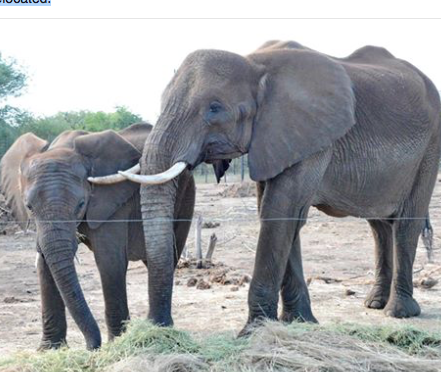
WICHITA -With all the activity involved in transporting the new elephants to the Sedgwick County Zoo on Friday, the Sheriff’s Department, who helped escort the elephants into town, shared the Omaha Zoo’s statement on why these elephants had to be rescued and relocated.
Seventeen African elephants were en route from drought-stricken Swaziland to the United States as part of an ongoing rescue mission to provide safe haven and a more secure future at three accredited zoos in Wichita, Omaha, and Dallas
“The elephants are doing well, and we’ve just received word from the veterinarians with them on the flight that they are eating, drinking and resting,” said Dennis Pate, executive director and CEO of Omaha’s Henry Doorly Zoo and Aquarium. “We are ready to welcome them to their new homes.”
Relocating elephants from Swaziland is an extremely complex logistical process undertaken with great care and attention to detail. No aspect of the process can be rushed. The three partner zoos and wildlife officials in Swaziland have been carefully planning for months and have been coordinating details since the U.S. Fish and Wildlife Service issued the permit to move these animals. The intricacy of such a move has required coordination with multiple governmental agencies, all of whom have been kept apprised of plans along the way.
“There has been a lot of false, misleading information spread by activists about this rescue mission, but the permit to relocate these elephants is legal and was issued after an intense review and approval by the U.S. Fish and Wildlife Service. The zoos were legally entitled to transport the elephants, and we knew we needed to act without further delay because the situation in Swaziland is deteriorating,” said Gregg Hudson, president/CEO of the Dallas Zoo. “Here in Dallas, and in Omaha and Wichita as well, our communities can take pride in helping save these elephants from certain death and giving them a healthy future at our zoos.”

The drought is causing one of the most significant health threats to the people and wildlife in the region, and Swaziland has declared a national state of emergency. The United Nations is providing food assistance to more than 200,000 people in the country.
Swaziland’s conservation management plan called for removal of 18 elephants from the parks to ease overpopulation of elephants and provide additional space and resources for critically endangered black rhinos.
The urgency of the situation increased in December when the three zoos were notified by wildlife managers in Swaziland of the death of one of those elephants that was awaiting relocation to the U.S. The death resulted from an acute gastrointestinal medical condition, which was impossible to treat. The zoos recognized it was their duty to act promptly on behalf of the remaining 17 elephants, by relocating them quickly so they could receive the veterinary care the zoos can provide. They are now en route to the U.S.
“In addition to the well-being of these elephants, we are resolute in our commitment to Swaziland’s conservation efforts, and are continuing to contribute funds for food being trucked in for the animals living in the national parks that desperately need it,” said Hudson. “We have a long-term commitment to the conservation of elephants and critically endangered rhinos in Africa that are facing extreme threats to their survival from poaching, drought, loss of habitat and human conflict. We are proud of our ongoing conservation partnership with the people of Swaziland.”
For more information about this relocation project and the drought conditions threatening Swaziland’s people and wildlife, please visit: www.RoomForRhinos.org.
